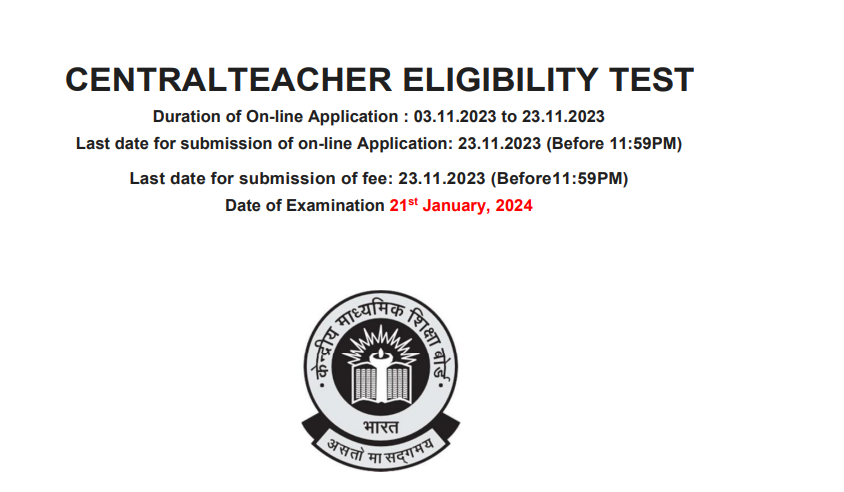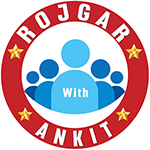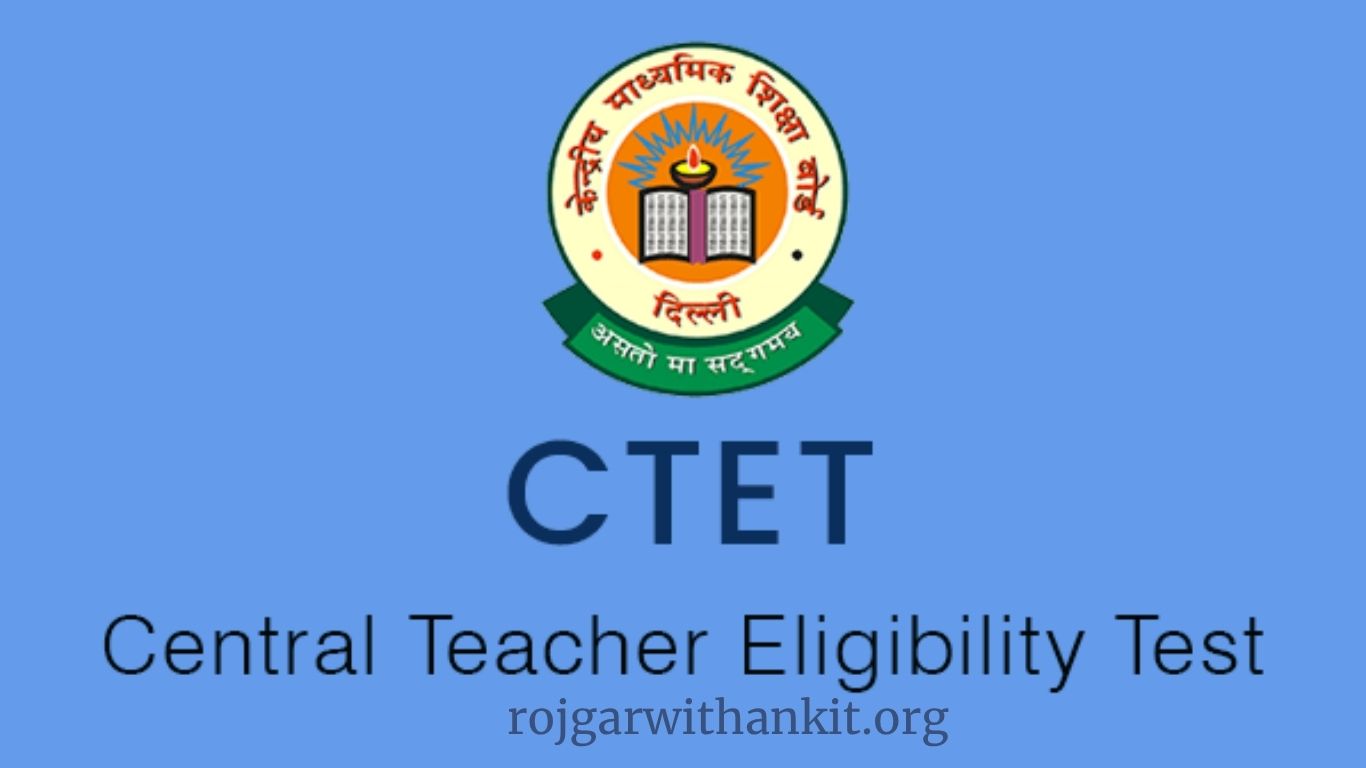CTET (सेंट्रल टीचर एलिजिबिलिटी टेस्ट) की परीक्षा का आयोजन CBSE द्वारा वर्ष में दो बार किया जाता है। यह परीक्षा उन अभ्यर्थियों के लिए अनिवार्य है, जो शिक्षक के रूप में अपना करियर बनाना चाहते हैं। जो उम्मीदवार सरकारी स्कूलों में शिक्षक बनने का सपना देखते हैं, उनके लिए CTET परीक्षा पास करना बेहद जरूरी है, क्योंकि केवल CTET क्वालिफाई करने वाले उम्मीदवार ही सरकारी शिक्षक बनने के पात्र होते हैं।
इस ब्लॉग में हम आपको CTET Exam 2025 से संबंधित सभी महत्वपूर्ण जानकारियां, जैसे कि पात्रता मानदंड (Eligibility), परीक्षा पैटर्न (Exam Pattern) और सिलेबस (Syllabus) आदि के बारे में विस्तार से बताएंगे।
हमारा उद्देश्य इस ब्लॉग के माध्यम से युवाओं को विभिन्न सरकारी नौकरियों के प्रति जागरूक करना और उनकी परीक्षा की तैयारी को और मजबूत बनाना है। इसलिए, इस ब्लॉग को अंत तक अवश्य पढ़ें और इसे अपने दोस्तों के साथ भी साझा करें।

CTET 2025 – मुख्य जानकारी
| विवरण | जानकारी |
|---|---|
| परीक्षा का नाम | CTET 2025 |
| आयोजक संस्था | केंद्रीय माध्यमिक शिक्षा बोर्ड (CBSE) |
| परीक्षा के प्रकार | पेपर 1 और पेपर 2 |
| पात्रता | D.El.Ed या B.Ed पास, साथ में स्नातक (Graduation) |
| न्यूनतम आयु सीमा | 18 वर्ष |
| CTET दिसंबर 2025 नोटिफिकेशन | जल्द जारी होगा |
| CTET दिसंबर परीक्षा तिथि | जल्द जारी होगी |
| CTET रजिस्ट्रेशन 2025 तिथि | जल्द जारी होगी |
| आधिकारिक वेबसाइट | https://ctet.nic.in/ |
CTET 2025 : पात्रता (Eligibility)
राष्ट्रीयता (Nationality) – CTET परीक्षा में शामिल होने के लिए उम्मीदवार का भारतीय नागरिक होना आवश्यक है। इसके अलावा, निम्नलिखित में से किसी एक शर्त को पूरा करने वाले उम्मीदवार भी पात्र होंगे –
- नेपाल के नागरिक (Nepali Subject)
- भूटान के नागरिक (Bhutani Subject)
- वे तिब्बती शरणार्थी, जो 1 जनवरी 1962 से पहले भारत में स्थायी रूप से बसने के उद्देश्य से आए हों।
- वे व्यक्ति, जो पाकिस्तान, श्रीलंका, केन्या, युगांडा, तंजानिया, म्यांमार (वर्मा), वियतनाम, ज़ाम्बिया या इथियोपिया से भारत में स्थायी रूप से बसने के उद्देश्य से आए हों।
CTET 2025: शैक्षणिक योग्यता (Educational Qualification)
CBSE द्वारा आयोजित CTET परीक्षा साल में दो बार होती है और इसमें दो पेपर शामिल होते हैं –
- पेपर 1 – प्राथमिक शिक्षक (Primary Teacher) बनने के इच्छुक उम्मीदवारों के लिए
- पेपर 2 – उच्च प्राथमिक शिक्षक (Upper Primary Teacher) बनने के इच्छुक उम्मीदवारों के लिए
दोनों पेपर के लिए न्यूनतम शैक्षणिक योग्यता अलग-अलग निर्धारित की गई है –
Educational Qualification for Paper 1 (कक्षा 1 से 5 के लिए शिक्षक)
- उम्मीदवार ने भारत के किसी मान्यता प्राप्त विद्यालय से 12वीं कक्षा कम से कम 55% अंकों के साथ पास की हो।
- साथ ही 2 वर्षीय डिप्लोमा इन एलीमेंट्री एजुकेशन (D.El.Ed) होना आवश्यक है।
Educational Qualification for Paper 2 (कक्षा 6 से 8 के लिए शिक्षक)
- उम्मीदवार ने भारत के किसी मान्यता प्राप्त विश्वविद्यालय से किसी भी विषय में स्नातक (Graduation) किया हो।
- साथ ही B.Ed की डिग्री होनी चाहिए।
NCTE (राष्ट्रीय शिक्षक शिक्षा परिषद) के अनुसार अतिरिक्त पात्रता
- जो उम्मीदवार किसी भी प्रकार का TTC (Teacher Training Course) कर रहे हैं, वे भी CTET परीक्षा के लिए पात्र हैं।
- जो उम्मीदवार स्नातकोत्तर (Post Graduation) के साथ B.Ed या M.Ed कर रहे हैं, वे भी CTET परीक्षा में शामिल हो सकते हैं।
आयु सीमा (Age Limit)
- न्यूनतम आयु: 18 वर्ष
- अधिकतम आयु: कोई निर्धारित सीमा नहीं (NA)
CTET दिसंबर 2025: आवेदन शुल्क (Application Fee)
जो उम्मीदवार CTET 2025 के लिए आवेदन करेंगे, उन्हें ऑनलाइन माध्यम (क्रेडिट कार्ड, डेबिट कार्ड, नेट बैंकिंग) से शुल्क का भुगतान करना अनिवार्य होगा। शुल्क का भुगतान किए बिना आवेदन प्रक्रिया पूरी नहीं मानी जाएगी।
| श्रेणी (Category) | केवल पेपर I या II (Only Paper I or II) | दोनों पेपर I एवं II (Both Paper I & II) |
|---|---|---|
| सामान्य / OBC (NCL) | ₹1000 /- | ₹1200 /- |
| SC / ST / दिव्यांग (PwD) | ₹500 /- | ₹600 /- |
CTET 2025: परीक्षा पैटर्न (Exam Pattern)
CTET परीक्षा MCQ (Multiple Choice Questions) पर आधारित होगी।
- प्रत्येक सही उत्तर के लिए 1 अंक मिलेगा।
- गलत उत्तर के लिए कोई नकारात्मक अंकन (Negative Marking) नहीं होगा।
- परीक्षा में कुल दो पेपर होंगे:
पेपर 1 (Paper I)
- यह पेपर उन उम्मीदवारों के लिए है जो कक्षा 1 से 5 तक के शिक्षक बनना चाहते हैं।
पेपर 2 (Paper II)
- यह पेपर उन उम्मीदवारों के लिए है जो कक्षा 6 से 8 तक के शिक्षक बनना चाहते हैं।
CTET 2025 – पेपर 1 का परीक्षा पैटर्न (कक्षा 1 से 5 के लिए प्राथमिक शिक्षक)
पेपर 1 में निम्नलिखित विषयों से बहुविकल्पीय प्रश्न (MCQs) पूछे जाएंगे –
| विषय | प्रश्नों की संख्या (MCQs) | अंक (Marks) |
|---|---|---|
| Child Development and Pedagogy (अनिवार्य) | 30 | 30 |
| Language I (अनिवार्य) | 30 | 30 |
| Language II (अनिवार्य) | 30 | 30 |
| Mathematics (गणित) | 30 | 30 |
| Environmental Studies (पर्यावरण अध्ययन) | 30 | 30 |
| कुल (Total) | 150 | 150 |
CTET 2025 – पेपर 2 का परीक्षा पैटर्न (कक्षा 6 से 8 के लिए उच्च प्राथमिक शिक्षक)
पेपर 2 में निम्नलिखित विषयों से बहुविकल्पीय प्रश्न (MCQs) पूछे जाएंगे –
| विषय | प्रश्नों की संख्या (MCQs) | अंक (Marks) |
|---|---|---|
| Child Development & Pedagogy (अनिवार्य) | 30 | 30 |
| Language I (अनिवार्य) | 30 | 30 |
| Language II (अनिवार्य) | 30 | 30 |
| Mathematics & Science (गणित एवं विज्ञान शिक्षक के लिए) | 60 | 60 |
| या (OR) | ||
| Social Studies / Social Science (सामाजिक अध्ययन शिक्षक के लिए) | 60 | 60 |
| कुल (Total) | 150 | 150 |
CTET 2025 – Language Paper (Paper I & Paper II) विकल्प
उम्मीदवार अपने Language Paper 1 और Language Paper 2 के लिए निम्नलिखित भाषाओं में से चुनाव कर सकते हैं।
ध्यान रखें कि Language Paper 1 और Language Paper 2 के लिए अलग-अलग भाषाओं का चयन करना अनिवार्य है।
भाषाओं की सूची (List of Languages)
- English
- Hindi
- Assamese
- Bengali
- Garo
- Gujarati
- Kannada
- Khasi
- Malayalam
- Manipuri
- Marathi
- Mizo
- Nepali
- Odia
- Punjabi
- Sanskrit
- Tamil
- Telugu
- Tibetan
- Urdu
CTET Exam के Paper l and Paper ll में शामिल विषयों को इस blog में cover किया गया है –
Paper l Syllabus
| Child Development and Pedagogy Syllabus- | a) Child Development (Primary School Child) – 15 questions Concept of development and its relationship with learning Principles of the development of children Influence of Heredity & Environment Socialization processes: Social world & children (Teacher, Parents, Peers) Piaget, Kohlberg and Vygotsky: constructs and critical perspectives Concepts of child-centred and progressive education Critical perspective of the construct of Intelligence Multi-Dimensional Intelligence Language & Thought Gender as a social construct; gender roles, gender-bias and educational practice Individual differences among learners, understanding differences based on diversity of language, caste, gender, community, religion etc. The distinction between Assessment for learning and assessment of learning; School-Based Assessment, Continuous & Comprehensive Evaluation: perspective and practice Formulating appropriate questions for assessing readiness levels of learners; for enhancing learning and critical thinking in the classroom and for assessing learner achievement. b) Concept of Inclusive education and understanding children with special needs – 5 Questions Addressing learners from diverse backgrounds including disadvantaged and deprived Addressing the needs of children with learning difficulties, ‘impairment’ etc. Addressing the Talented, Creative, Specially abled Learners c) Learning and Pedagogy – 10 Questions How children think and learn; how and why children ‘fail’ to achieve success in school performance. Basic processes of teaching and learning; children’s strategies of learning; learning as a social activity; social context of learning. Child as a problem solver and a ‘scientific investigator’ Alternative conceptions of learning in children, understanding children’s ‘errors’ as significant steps in the learning process. Cognition & Emotions Motivation and learning Factors contributing to learning – personal & environmental | 30 Questions |
| Language I | a) Language Comprehension – 15 Questions Reading unseen passages – two passages one prose or drama and one poem with questions on comprehension, inference, grammar and verbal ability (Prose passage may be literary, scientific, narrative or discursive) b) Pedagogy of Language Development – 15 Questions Learning and acquisition Principles of language Teaching Role of listening and speaking; function of language and how children use it as a tool A critical perspective on the role of grammar in learning a language for communicating ideas verbally and in written form Challenges of teaching language in a diverse classroom; language difficulties, errors and disorders Language Skills Evaluating language comprehension and proficiency: speaking, listening, reading and writing Teaching-learning materials: Textbook, multi-media materials, multilingual resource of the classroom Remedial Teaching | 30 Questions |
| Language II | a) Comprehension – 15 Questions Two unseen prose passages (discursive or literary or narrative or scientific) with questions on comprehension, grammar and verbal ability b) Pedagogy of Language Development – 15 Questions Learning and acquisition Principles of language Teaching Role of listening and speaking; function of language and how children use it as a tool A critical perspective on the role of grammar in learning a language for communicating ideas verbally and in written form; Challenges of teaching language in a diverse classroom; language difficulties, errors and disorders Language Skills Evaluating language comprehension and proficiency: speaking, listening, reading and writing Teaching-learning materials: Textbook, multi-media materials, multilingual resource of the classroom Remedial Teaching | 30 Questions |
| Mathematics | a) Content: 15 Questions Geometry Shapes & Spatial Understanding Solids around Us Numbers Addition and Subtraction Multiplication Division Measurement Weight Time Volume Data Handling Patterns Money b) Pedagogical issues – 15 Questions Nature of Mathematics/Logical thinking; understanding children’s thinking and reasoning patterns and strategies of making meaning and learning Place of Mathematics in Curriculum Language of Mathematics Community Mathematics Valuation through formal and informal methods Problems of Teaching Error analysis and related aspects of learning and teaching Diagnostic and Remedial Teaching | 30 Questions |
| Environmental Studies | a) Content: 15 Questions Family and Friends: Relationships Work and Play Animals Plants Food III. Shelter Water Travel Things We Make and Do b) Pedagogical Issues: 15 Questions Concept and scope of EVS Significance of EVS, integrated EVS Environmental Studies & Environmental Education Learning Principles Scope & relation to Science & Social Science Approaches of presenting concepts Activities Experimentation/Practical Work Discussion CCE Teaching material/Aids Problems | 30 Questions |
Paper ll Syllabus
| Child Development and Pedagogy | (a) Child Development (Elementary School Child) Concept of development and its relationship with learning Principles of the development of children Influence of Heredity & Environment Socialisation processes: Social world & children (Teacher, Parents, Peers) Piaget, Kohlberg and Vygotsky: constructs and critical perspectives Concepts of child-centred and progressive education Critical perspective of the construct of Intelligence Multi-Dimensional Intelligence Language & Thought Gender as a social construct; gender roles, gender bias and educational practice Individual differences among learners, understanding differences based on diversity of language, caste, gender, community, religion, etc. The distinction between Assessment for learning and assessment of learning: School-Based Assessment, Continuous and comprehensive Evaluation: perspective and practice Formulating appropriate questions for assessing readiness levels of learners for enhancing learning and critical thinking in the classroom and for assessing learner achievement. (b) Concept of Inclusive education and understanding children with special needs Addressing learners from diverse backgrounds, including disadvantaged and deprived Addressing the needs of children with learning difficulties, ‘impairment’, etc. Addressing the Talented, Creative, Specially abled Learners (c) Learning and Pedagogy How children think and learn; how and why children ‘fail’ to achieve success in school performance. Basic teaching and learning processes; children’s learning strategies; learning as a social activity; social context of learning. Child as a problem solver and a ‘scientific investigator’ Alternative conceptions of learning in children, understanding children’s ‘errors’ as significant steps in the learning process. Cognition & Emotions Motivation and learning Factors contributing to learning – personal & environmental |
| Language Paper l | (a) Language Comprehension: Reading unseen passages – two passages, one prose or drama and one poem with questions on comprehension, inference, grammar and verbal ability. (b) Pedagogy of Language Development Learning and acquisition Principles of Language Teaching Role of listening and speaking; function of language and how children use it as a tool A critical perspective on the role of grammar in learning a language for communicating ideas verbally and in written form; Challenges of teaching language in a diverse classroom; language difficulties, errors and disorders Language Skills Evaluating language comprehension and proficiency: speaking, listening, reading and writing Teaching-learning materials: Textbook, multimedia materials, multilingual resources of the classroom Remedial Teaching |
| Language Paper II | (a) Comprehension: Two unseen prose passages (discursive or literary or narrative or scientific) with questions on comprehension, grammar and verbal ability (b) Pedagogy of Language Development Learning and acquisition Principles of Language Teaching Role of listening and speaking; function of language and how children use it as a tool A critical perspective on the role of grammar in learning a language for communicating ideas verbally and in written form; Challenges of teaching language in a diverse classroom; language difficulties, errors and disorders Language Skills Evaluating language comprehension and proficiency: speaking, listening, reading and writing Teaching-learning materials: Textbook, multimedia materials, multilingual resources of the classroom Remedial Teaching |
| Mathematics | (a) Content Number System Knowing our Numbers Playing with Numbers Whole Numbers Negative Numbers and Integers Fractions Algebra Introduction to Algebra Ratio and Proportion Geometry Basic geometrical ideas (2-D) Understanding Elementary Shapes (2-D and 3-D) Symmetry: (reflection) Construction (using Straight edge Scale, protractor, compasses) Mensuration Data handling (b) Pedagogical issues Nature of Mathematics/Logical Thinking Place of Mathematics in Curriculum Language of Mathematics Community Mathematics Evaluation Remedial Teaching Problem of Teaching Science (a) Content Food Materials The World of the Living Moving Things People and Ideas How things work Natural Phenomena Natural Resources (b) Pedagogical issues Nature & Structure of Sciences Natural Science/Aims & objectives Understanding & Appreciating Science Approaches/Integrated Approach Observation/Experiment/Discovery (Method of Science) Innovation Text Material/Aids Evaluation – cognitive/psychomotor/affective Problems Remedial Teaching |
| Social Studies/Social Sciences | History Geography Social and Political Life pedagogical |
CTET Exam 2025 – Qualifying Marks
- General Category: 60% (यानी कम से कम 90 अंक / 150 में)
- OBC / SC / ST: 55% (यानी कम से कम 82 अंक / 150 में)
CTET Exam 2025 – Number of Attempts
- CTET परीक्षा में कोई भी प्रयास की सीमा (Number of Attempts) निर्धारित नहीं है।
- उम्मीदवार इस परीक्षा को अनगिनत बार दे सकते हैं ताकि वे अपने स्कोर को बेहतर कर सकें।
- CTET प्रमाणपत्र की वैधता (Validity) आजीवन होती है।
CTET Exam 2025 : Admit Card
CBSE परीक्षा की तारीख से लगभग 1 सप्ताह पहले CTET Admit Card अपनी आधिकारिक वेबसाइट पर जारी करता है। उम्मीदवार इसे आसानी से निम्नलिखित स्टेप्स से डाउनलोड कर सकते हैं –
Admit Card डाउनलोड करने के चरण:
- आधिकारिक वेबसाइट ctet.nic.in पर जाएं।
- Admit Card सेक्शन पर क्लिक करें।
- CTET Admit Card 2025 लिंक को चुनें।
- मांगी गई डिटेल्स (रजिस्ट्रेशन नंबर / डेट ऑफ बर्थ / नाम) दर्ज करें।
- Admit Card डाउनलोड करें और प्रिंट आउट लें।
CTET Exam 2025 : Result
CTET परीक्षा का परिणाम (Result) परीक्षा के 1–2 महीने बाद जारी किया जाता है। उम्मीदवारों को आधिकारिक वेबसाइट पर अपडेट चेक करते रहना चाहिए।
Result डाउनलोड करने के चरण:
- ctet.nic.in पर जाएं।
- Result Section पर क्लिक करें।
- CTET Result 2025 लिंक चुनें।
- अपना Roll Number दर्ज करें।
- Result डाउनलोड करें और प्रिंट आउट लें।
Frequently Asked Questions
What is CTET?
CTET (Central Teacher Eligibility Test) is India’s national-level eligibility exam conducted by CBSE to certify candidates for teaching in Classes I–VIII in central government and affiliated schools.
When will the CTET 2025 exam take place?
The notification is expected around August 2025, with exams likely in July 2025 for both sessions (first and second half of year)
Who can apply for CTET Paper‑1 (Classes I–V)?
You need 12th (Senior Secondary) with at least 50% marks plus 2‑year D.El.Ed (or equivalent), or a 50% in 12th + B.El.Ed. A 45% + D.El.Ed option exists for reserved categories.
What about CTET Paper‑2 (Classes VI–VIII)?
You must have a Bachelor’s degree with minimum 50% and either completed or in Final Year of B.Ed/D.El.Ed. Reserved categories may have marginal relaxations.
Are there age limits or experience requirements?
The minimum age is 18 years, with no maximum limit. No teaching experience is required. There’s no cap on number of attempts—you can retake to improve your score.
Conclusion
CTET 2025 exam is a crucial step for aspiring teachers seeking opportunities in central government schools and other educational institutions across India. Understanding the eligibility criteria, exam pattern, and syllabus is essential for effective preparation. Candidates must ensure they meet the qualification requirements for Paper I or Paper II, depending on the classes they wish to teach. A thorough understanding of the exam structure and subject-wise syllabus helps in strategizing study plans and boosting confidence. By staying updated with official notifications and preparing systematically, candidates can enhance their chances of qualifying for CTET 2025 and building a successful teaching career.

